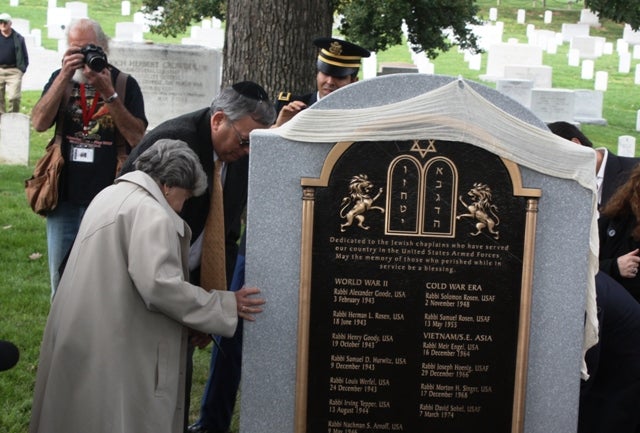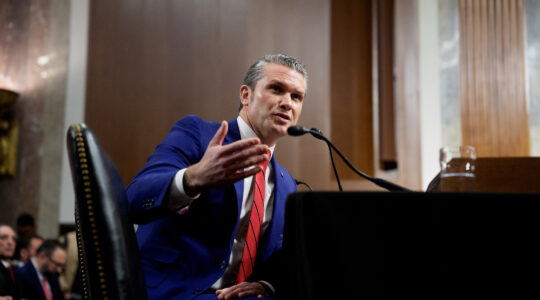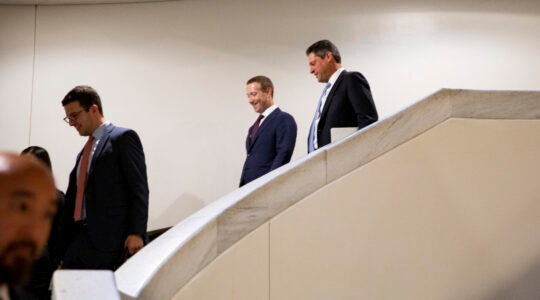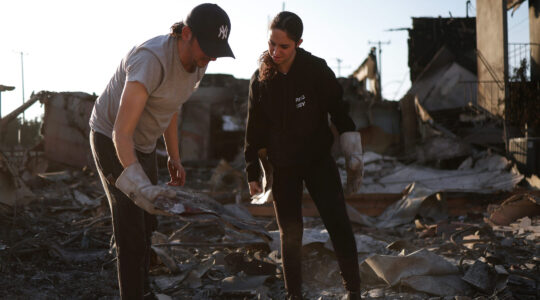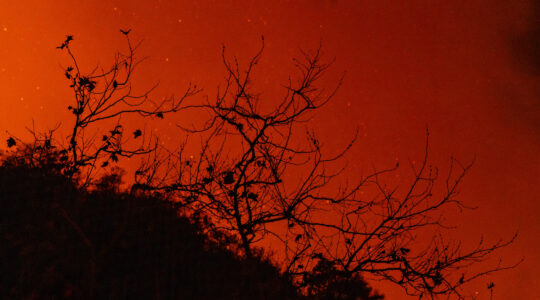
The monument to Jewish chaplains, right, joins those honoring chaplains of other faiths on Chaplains Hill. (Courtesy Sons of the American Legion Radio)
ARLINGTON, Va. (JTA) — Fourteen Jewish military chaplains who gave their lives in service to their country finally have a place of honor in Arlington National Cemetery.
Family members of the fallen chaplains were joined Monday by community leaders, politicians, and current and retired military personnel for a ceremony marking the unveiling of the Jewish chaplains memorial on Chaplains Hill.
The new monument features a plaque inscribed with the names of the 14 Jewish chaplains, who died serving during World War II, the early years of the Cold War and in Southeast Asia. It stands beside separate monuments honoring fallen Protestant and Catholic chaplains that have been present on Chaplains Hill since 1981 and 1989, respectively.
“Chaplains Hill now represents the diverse fabric that has made our nation stronger,” said U.S. Rep. Debbie Wasserman Schultz (D-Fla.).
“Faith is the most powerful weapon in our military’s arsenal,” said Rep. Jeff Miller (R-Fla.), chairman of the House of Representatives Committee on Veterans Affairs. “Through the service of our military chaplains, our soldiers are never alone.”
Several hundred people gathered in the Memorial Amphitheater at Arlington National Cemetery for the ceremony, which included the Presentation of the Colors and musical entertainment by the West Point Jewish Choir.
The unveiling marks the culmination of several years of effort to create a memorial for Jewish chaplains. The push began with a discovery by amateur historian Ken Kraetzer of White Plains, N.Y., related to the famous story of four World War II chaplains — two Protestants, a Catholic and a Jew, Rabbi Alexander Goode — who perished aboard the USS Dorchester in 1943. As the troop transport sunk after being torpedoed by a German submarine, the four chaplains gave away their life jackets to other military personnel, prayed and consoled others aboard.
The Catholic and Protestant chaplains were represented on the other monuments on Chaplains Hill, and Kraetzer was surprised and dismayed on a 2007 visit to the site to learn that there was no recognition of Goode or for that matter other fallen Jewish chaplains.
The realization set off a whirlwind of phone calls, letters and meetings, fundraising, advocacy on the part of Jewish groups and other supporters of a Jewish chaplains memorial and ultimately a congressional resolution that was approved unanimously in May.
“And here we are today, three years later,” Kraetzer said, “with this fitting monument to honor much loved husbands and fathers and sons and brothers, each with his own personal biography that ended too soon.”
Ernest Heaton, 89, one of two remaining survivors from the USS Dorchester, attended the dedication ceremony and recalled the chaplains’ bravery.
“Rabbi Goode’s name will live on forever with the other chaplains on these hallowed grounds,” Heaton said.
Paul Fried, Goode’s son-in-law, named his son Alexander David Fried, now 41, in the rabbi’s honor. Both were on hand for the ceremony.
“You share that sense of pride, but also of loss,” the younger Fried said. “There’s always that sense of what would our lives have been like if they were in them.”
JTA has documented Jewish history in real-time for over a century. Keep our journalism strong by joining us in supporting independent, award-winning reporting.
